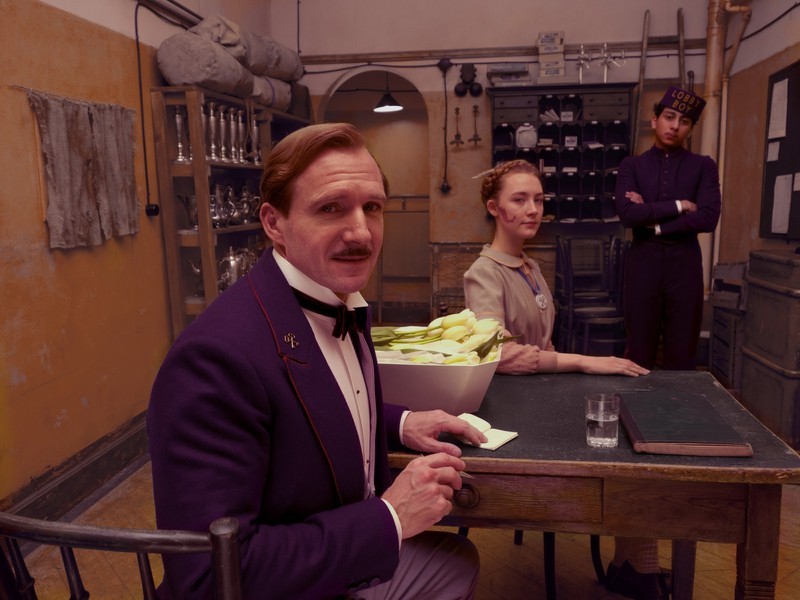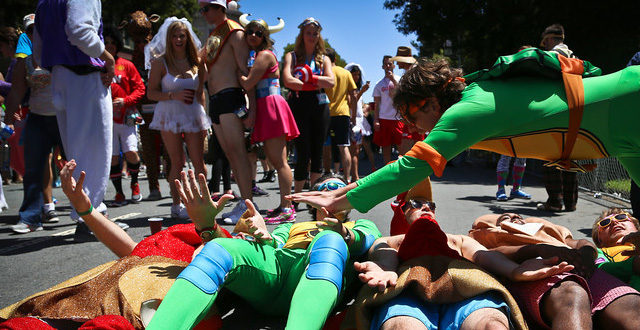Movie Review: Wes Anderson’s ‘The Grand Budapest Hotel’ Is Very Welcoming

What’s so curious about Wes Anderson’s films is that everyone feels just similar enough — whether it’s the classic rock music, his knack for using a revolving door of actors, or the idiosyncratic and meticulous way he sets up his shots — that they have the feeling of small pieces in a larger body of work. For some this is a detriment, as if Anderson is continuously remaking himself or that he can’t do anything different. But for his many fans, they applaud his distinctive style and the way that he continues to utilize similar themes, actors, and visual styles, but is still able to make it feel fresh every time. The Grand Budapest Hotel doesn’t buck that trend, but Wes Anderson has made the most mature, and possibly funniest, film of his career.
Almost Inception-like in its storytelling layers, Anderson takes obvious delight — perhaps with a bit of a wink — at such a quirky set up. Opening with a girl reading a book by The Author (Tom Wilkinson), who then describes the story he was told as a young man, it cuts to his younger self played by Jude Law inhabiting a near empty and dilapidated Grand Budapest Hotel in the 1960’s. Situated atop a mountain in the fictional Republic of Zubrowka in central Europe, Young Writer, as he’s referenced, encounters the hotel’s seemingly sorrowful owner Zero Moustafa (F. Murray Abraham). Striking up a conversation he asks Zero how he came into ownership of the hotel and why he still keeps it open.
Another flashback and Zero’s story begins in 1932 when The Grand Budapest Hotel was at its peak and much of its acclaim was due to its delightful concierge M. Gustave (Ralph Fiennes). Not only does he have a penchant for providing excellent service for his hotel’s guests, he also has a penchant for spending the night with a number of aging, blonde female guests. One such guest is Madame D (Tilda Swinton) who is well into her 80’s and after reluctantly leaving Gustave and the the hotel, she dies mysteriously. Soon Gustave, and a young Zero (Tony Revolori), then a green lobby boy, are pulled into a family drama with her greedy, black-clad son Dmitri (Adrien Brody) and his assassin J.G. Jopling (Willem Dafoe).
It’s perhaps the most exhilarating story Anderson has ever told and, with a solo writing credit for the first time in his career, he doesn’t hold anything back. Soon Gustave and Zero are on a journey that increasingly includes a cast of crazy characters, all set against an impending war that recalls War World II and the invasion of the Nazis. Although the film has some truly disturbing and despondent scenes — especially by Anderson’s standards — it never loses that levity for which he’s known. Much of that is due to Ralph Fiennes’ incredible performance as Gustave, in what could easily be called the role of his career thus far. He gives it everything he has and moves effortlessly between proper to pompous in the blink of an eye. He’s so exuberant in the part that his pairing with newcomer and the more down to earth Tony Revolori, allows the two to work off each other splendidly. Revolori acts as a perfect foil for Fiennes’ lavishness and only enhances Fiennes’ ridiculousness at times.
What’s so astounding about the film is that despite some strong undercurrents of tragedy and genocide, it never loses its buoyancy. And as confusing as it sounds, and sometimes it can feel overly complex, it’s this intricacy that gives the film substance, and shows Anderson working at the top of his game. Just as Moonrise Kingdom saw a new, sweeter side of Wes Anderson, The Grand Budapest Hotel finds him synthesizing everything he’s done before and using it to create something deeper and greater.
Rating: 4.5 out of 5





